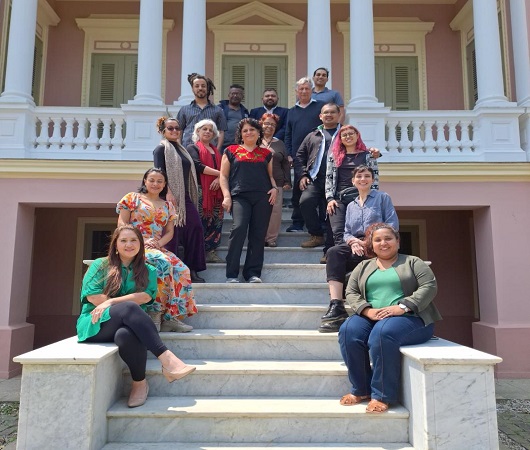The Itaboraí Forum: Politics, Science and Culture in Health/Fiocruz Petrópolis is moving forward with the Multicentric project, an initiative that aims to apply Social Technology tools to reduce social inequalities as a determinant of health inequities in five vulnerable Latin American countries. Representatives from the National Public Health Institutes of Argentina, El Salvador and Mexico and from the Latin American School of Social Sciences (FLACSO) in Paraguay were in Petrópolis for the third stage of the project, which consisted of assessing the use of tools such as Participatory Rapid Appraisal (PRA) and Participatory Mapping (PM) in these territories. Researchers from Colombia participated online.
The Multicentric project applies Social Technology tools to reduce social inequalities as a determinant of health inequities in five vulnerable Latin American countries (photo: Itaboraí Forum)
The first stage of the project took place in Petrópolis in June, with training for these professionals in social technology tools. On the occasion, the professionals had access to a theoretical presentation on the Social Determinants of Health, social inequalities and inequities in Health, the Sustainable Development Goals (SDGs) and the 2030 Agenda, and Primary Health Care and intersectorality. The tools were also put into practice in Alto Independência, one of Petrópolis' vulnerable areas.
The second stage of the initiative involved technicians from the Itaboraí Forum going to Latin American countries to support the application of the tools in these territories. The regions where the work was carried out were: Dock Sud, in Avellaneda, Argentina; Maurício Jose Troche, in Paraguay; Guasca, in the Cundinamarca region of Colombia; Panchimalquito, in El Salvador; and Atlacholoaya, in Morelos, Mexico.
The director of the Itaboraí Forum, Felix Rosenberg, points out that the methodology and purpose of the work were incorporated very quickly by the professionals from the territories. "It was made a very precise x-ray of the territorial reality. It is now important to seek intersectoral support to continue the work. The PRA is a permanent process of listening to the population of the territory, it is a continuous process of a transformative methodology."
Marina Rodrigues de Jesus, a social worker at the Itaboraí Forum, was one of the technicians who accompanied the work in El Salvador and Mexico. She stressed the importance of appropriating the methodology before the technicians go into the field and that the PRA is a counter-hegemonic, counter-colonizing tool. "Everything that is produced in the territory goes to the community, and the people need to be part of that," she says.
Zaida Alvarez, of the Public Health Institute of El Salvador, sees the application of the tools as an innovation in the approach to community work. "This allows us to generate skills and strengthen the work of our community agents, who are health promoters dedicated to working in the community. So what we want is for follow-up work to be carried out, strengthening listening to the population, and through this, identifying the social determinants and being able to overcome health inequities," she says.
Karol Cotes, from the Public Health Institute of Colombia, adds that the experience of applying PRA and mapping in Guasca was stimulating, reassuring and hopeful. "It generated mutual learning, bonding and an exercise in free listening."
The Multicentric project will continue with the development of a set of indicators to systematize the results of the experiences in these territories. One of the next steps will be to set up an online observatory to collate this information and provide a source of research for other regions and countries.
The project
The Multicentric project emerged from a consensus established in seminars and international meetings of the Latin American network of the International Association of National Public Health Institutes (LatAm Ianphi), held in 2022 and 2023, regarding the need for effective action to reduce social inequalities and health inequities. The US Centers for Disease Control (CDC) funded the initiative through the Ianphi secretariat in the US and the logistical support of the Fiocruz Support Foundation (Fiotec). In line with Fiocruz's health promotion policies and inspired by the 2011 World Conference on Health Determinants and the Ianphi declarations, the Multicentric project took shape based on the experience of the Itaboraí Forum: Politics, Science and Culture in Health, of Fiocruz, which developed social technology tools for diagnosis and intervention in territories of high social fragility in Petrópolis.


